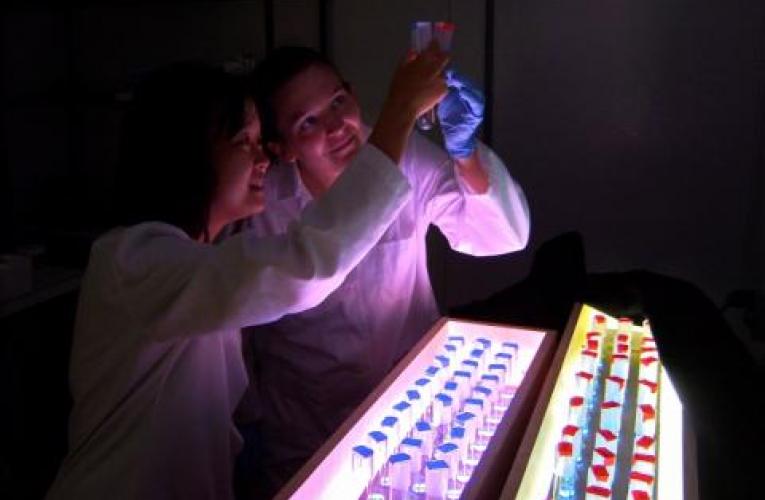Tim Lucas, 919-613-8084, tdlucas@duke.edu
By Kati Moore, MEM ‘16
Nicholas School Communications Student Assistant
August 13, 2015
DURHAM, N.C. – Zackary Johnson, Arthur P. Kaupe Assistant Professor of Molecular Biology in Marine Science at Duke University’s Nicholas School of the Environment, has received a grant from the U.S. Department of Energy to establish a consortium to study the extraction, development and commoditization of various products from algae.
The grant is for a maximum of $5.2 million over three years. The consortium, dubbed MAGIC – short for Marine Algae Industrialization Consortium – will include a variety of university and corporate partners.
Algae-based oil has been pursued as a renewable source of fuel since the 1970s, but high production costs prevented it from becoming a competitor with crude oil. The consortium’s goal, Johnson said, is to find ways to drive down the cost of oil extracted from algae. To do this, they need to maximize the value of other products that can be made from algae, such as proteins.
“To make algae a competitive player in this field you have to consider all the things the algae are producing,” Johnson said. “We’re essentially trying to make oil the waste product, so that it can compete with fossil fuels.”
The key is to strike a balance. One of the MAGIC researchers’ goals will be to find the types of algae and the specific growing conditions that result in low-cost oil while providing high-quality protein products.
“They’re not mutually exclusive, but you can’t optimize everything at once,” Johnson said. “There are trade-offs. That’s where the economic analysis comes in.”
Protein extracted from the algae may be used in a variety of ways. MAGIC will study using algae protein as a component of fish, poultry, and swine feed, and as a substitute for current protein products in the food industry, such as whey, which is derived from milk.
“It turns out that whey is not very environmentally friendly,” Johnson said. “If you can replace milk protein with algae protein, you can skip the methane produced by cows, the land use, the water use. Marine algae don’t use fresh water and don’t have to compete with traditional crops for arable land, so to the degree to which they can produce food cheaply, they are highly attractive.”
Substituting algae protein in animal feed may have human benefits as well. Because algae are high in iron, including algae protein in poultry feed would increase the amount of iron in the meat produced. Chicken is not considered a good source of iron compared with beef, but algae protein products could change that.
Previous work by Johnson and his colleagues at Cornell University has shown that some types of algae produce proteins that can be successfully incorporated into swine and poultry feed. “Our work now is to identify better products, and make all those processes more efficient,” Johnson said.
MAGIC will conduct research on the entire process of getting algae products to market, from algae selection and cultivation, to extraction and product preparation, to creation of mass production methods, to techno-economical life cycle analysis.
Each step of the research process will include multiple investigators. “It’s a team effort, and each partner brings their own expertise,” Johnson said.
In addition to Duke University, MAGIC will include the University of Hawaii, Archer Daniels Midland, Bentley University, Bucknell University, Cornell University, OpenAlgae, Shell Global Solutions (US) Inc., University of Nordland, The University of Southern Mississippi, and Valicor Renewables.
The mix of university and corporate partners means a mix of environmental and economic goals. But at the end of the day, Johnson said, they all want the same thing: a cost-effective, environmentally-friendly source of fuel and food. “Everyone’s committed to finding that balance,” Johnson said.
###

